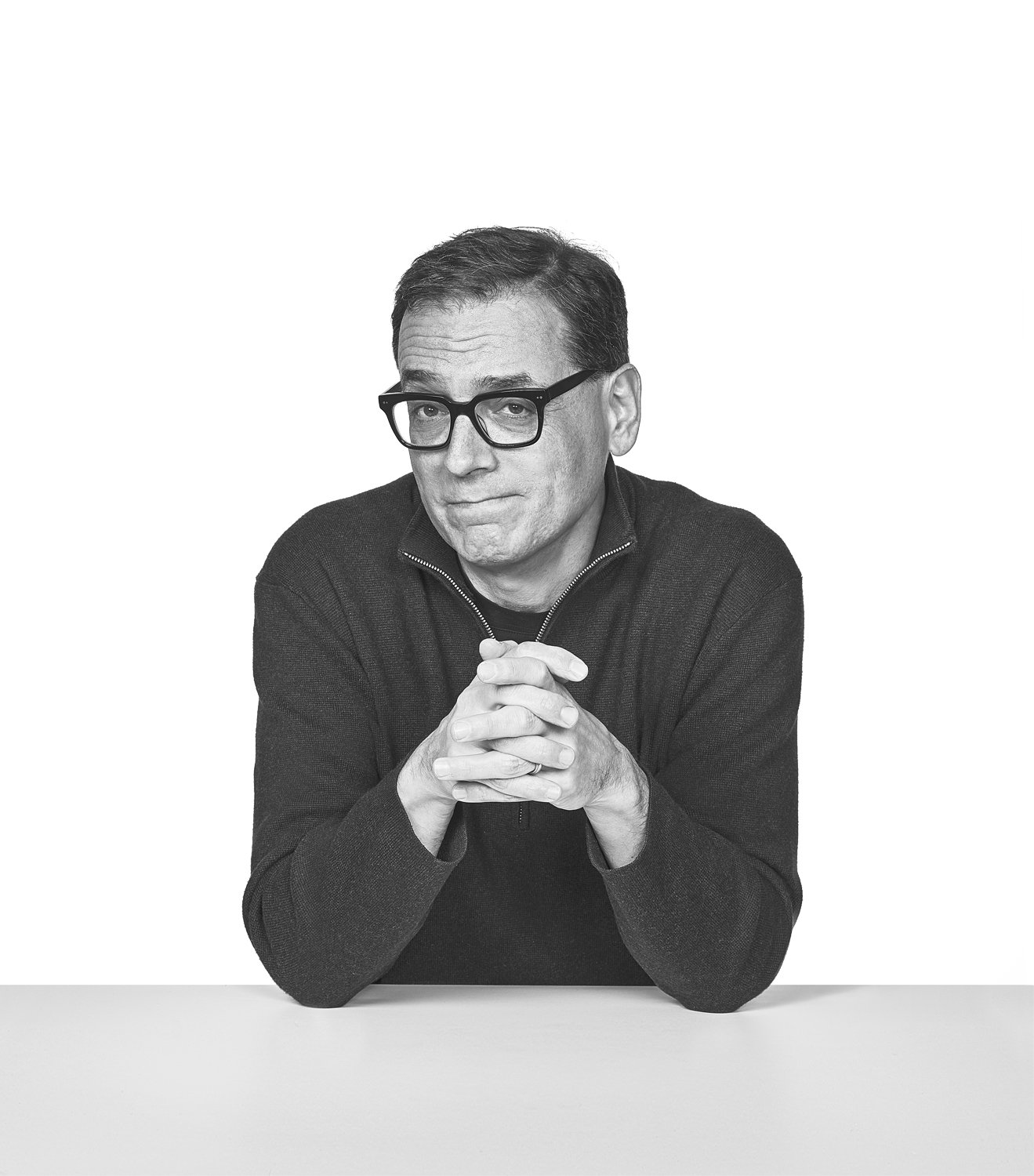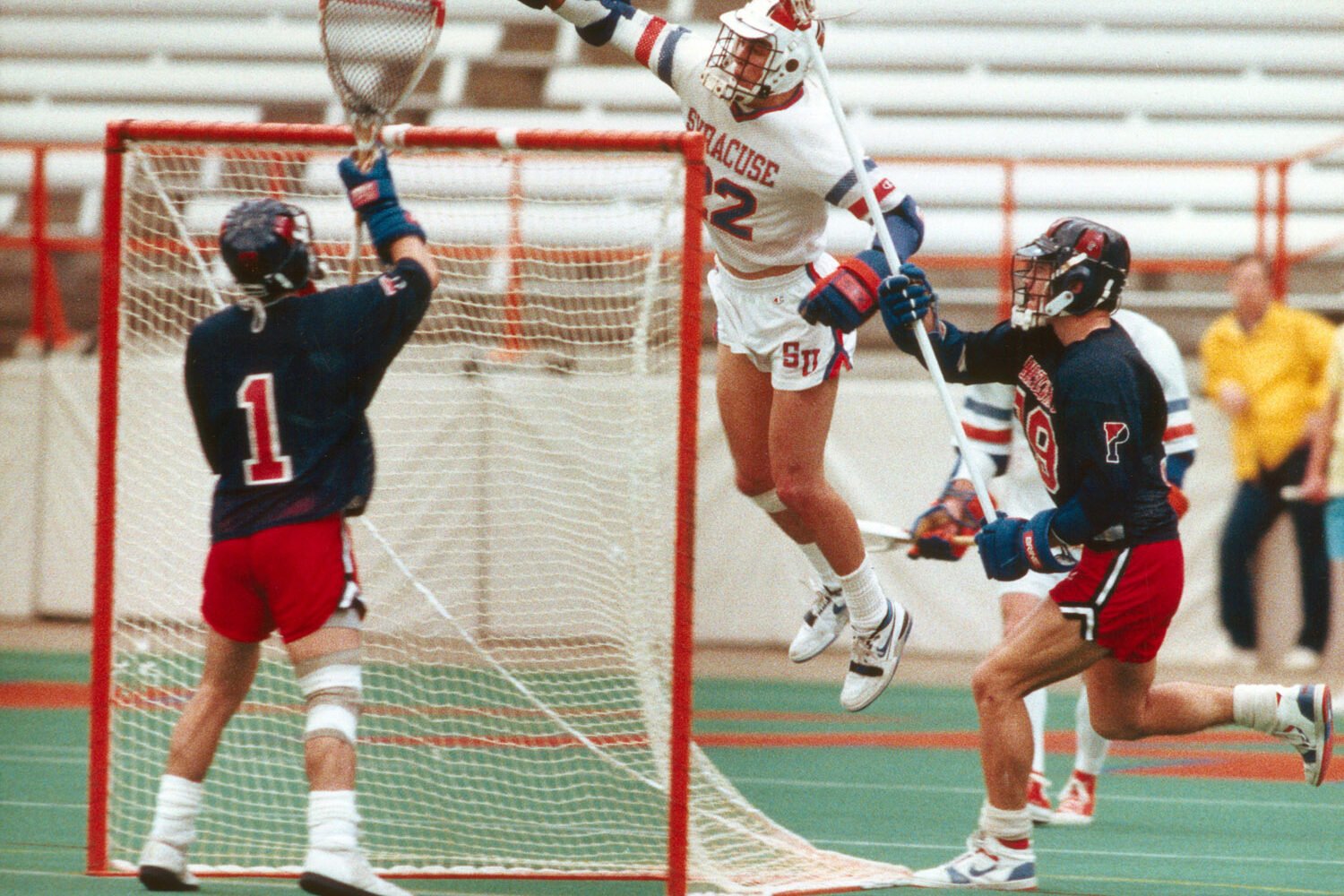Daniel H. Pink is a Washington rarity. After spending time working in Bill Clinton’s administration, including as a speechwriter for former Vice President Al Gore, Pink stayed in DC but left politics behind. Instead, beginning with the best-selling 2001 book Free Agent Nation, he mined social-science research for lessons on how people can build more productive, meaningful careers. In his books and “The Pinkcast”—a video series shot at his home in Cleveland Park—Pink explores topics such as the science of motivation, why we work best in the morning, and the secret to making the ultimate pandemic sandwich (peanut butter, pickles, sriracha).
His newest book, The Power of Regret: How Looking Backward Moves Us Forward, analyzes the regrets of more than 16,000 people from 105 countries, many of whom bared their souls to him about loves lost and roads not taken. Over coffee in the converted garage that serves as his home office, Pink discussed his own biggest regrets, the reasons so many Americans are quitting their jobs, and why we shouldn’t take career advice from Jeff Bezos.
You write that regret is the most misunderstood human emotion. What do we get wrong?
We think of regret as this negative emotion having no benefits at all—something to be avoided, something to be denied. But I think if we embrace it in the right way, regret can actually be a useful emotion.
When did you start to embrace your own regrets?
What got me onto this topic was going to my elder daughter’s college graduation. It was really long, and her last name starts with “P,” so you’ve got to wait. I just started thinking, “God, this is almost fantastical—I feel like I graduated from college, like, last year.” And I started thinking about my own time in college and regrets I had about it. That’s what got me thinking about this.
As I read your book, I kept thinking about Frank Sinatra’s “My Way”: “Regrets, I’ve had a few, but then again, too few to mention.” Do people not like to talk about their regrets because it’s sort of unseemly to say, “Woe is me, I went to the wrong law school”?
I don’t think the resistance is about unseemliness. I think people don’t like talking about regret because, to put it in therapeutic terms, it’s a narcissistic injury of some kind. We want to project this image of flawlessness to the world, where everything is great. And regret says, “It isn’t.” Yet the dirty little secret is that regret actually helps you make progress.
How so?
Because regret is a tool that helps us learn. It’s adaptive. Our culture has gone overboard on positivity, when in fact negative emotions are more valuable. There’s a reason our species feels regret. If it hadn’t been useful for us, it would have been weeded out of our psyche. Its prevalence in our lives and its utility are two sides of the same coin.
Washington is one of the most affluent, highly educated areas in the US. You uncovered some revealing data suggesting it might also be particularly rife with people harboring professional regrets. Can you explain why?
What I found was that the more education and income you had, the more regrets you had about your career. So what’s the explanation? I think it’s twofold. One is that opportunity drives regret. If you’re a Georgetown law-school graduate living in Washington, you’ve probably had a lot of career options—and therefore you had a lot of [untaken] options, which might lead to regret. I would also speculate that for the well-educated—you know, serious people with elite formal educations who work in professional jobs and live in Washington, DC—a career is a greater part of their identity than it is for other people.
People seem to be channeling those professional regrets in interesting ways. More workers than ever are quitting their day jobs and striking out on their own, as your first book predicted 20 years ago.
Free-agent nation, baby! In that book, I may have been, as they say in Washington, ahead of the voters.
So what lessons should employers and policymakers draw from these trends?
The lesson is that people want to be able to do something interesting and big and psychologically rich. That’s who we are. All of us have an innate sense of our mortality, and we don’t want to squander it. We don’t want to throw away our shot. So it makes no sense for companies to tell people, “Okay, you know how to do X, so therefore keep doing X,” rather than put them into roles and assignments where they’re able to do something bigger, more interesting, and have more growth.
One woman I interviewed over Zoom cried about her deepest moral regret: She bullied a kid on a school bus when she was eight or nine years old. It shows that most people in most places want to do the right thing. And there might be a growing unease among workers in some organizations that they’re not doing the right thing. If your job’s not going to give you job security and you’re worried you’re going to do the wrong thing, what’s the point?
What’s also clear is that we want close relationships. That’s extremely important for building coherent organizational cultures. One of the most poignant regrets in the book was the fellow who told me that he’d been working in the same place for 30 years and realized that he wasn’t really friends with any of his colleagues. That’s sad.
So we want people to accept and embrace regret as part of the human condition. But do institutions and companies also have a responsibility to help people avoid regret?
They should anticipate the kinds of regrets that people will have and mitigate those. There’s something to be said for individual leaders revealing their regrets to their teams and saying, “Let me tell you about this regret that I have, this decision that I made that bugs me. And here’s what I did about it.” There’s overwhelming evidence that’s a winning leadership strategy.
Isn’t that softening the edges too much for people?
No, the opposite. What we say to people right now is not to even worry about regret: Look forward, never look backward. Think positive, be positive. That’s softened the edges. I want to add some right angles back to this and say, “Hold on a second. That regret you have that’s poking you? It should poke you, and you’ve got to listen to it.” You have to use it as a signal.
How might the power of regret be applied to social policy—like, say, the criminal-justice system? Can society do more to help people turn regrets about their mistakes into something positive?
The restorative-justice movement is something along those lines. It’s not about denying that I did something wrong, nor is it about having what I did wrong define me. It’s a third way, in the same way that I’m suggesting a third way in how we deal with regret—one that reckons with it, confronts it, and then extracts a lesson from it.
In the book, I say that deriving meaning from regret requires people to demonstrate “self-compassion.” There’s also a strong argument that regret helps us show compassion and kindness to others. When I reflect on my own life, a lot of my regrets are about kindness. I think about being in school and times where there was a kid left out, or a kid who was maybe a little bit different, and I didn’t do a damn thing. I wasn’t cruel. But it’s an inaction regret—I didn’t take an affirmative step to be consciously kind to people.
It’s amazing how much those memories stick with all of us.
When I think about my life, like, pre–age 25, I just wasn’t kind enough. And I definitely feel regret from that. There’s nothing I can do. I can’t go back and find somebody who was mistreated by others and say, “I’m sorry that in Mrs. McMullan’s class in sixth grade, I didn’t step in when people were making fun of you.” But I can go forward and say, “I’m going to try to treat everybody with a greater degree of kindness than I did then.”
What is so interesting about moral regrets is that so many of us have them. It’s pretty universal. I think it’s a good sign that we’re bothered by this stuff that happened in sixth grade. That makes me feel better about humanity.
Toward the end of the book, you quote from a 2001 interview with Jeff Bezos in which he talks about basically organizing his life around being able to look back at age 80, having “minimized the number of regrets I have.” He’s done pretty well for himself. Why isn’t that a model for the rest of us?
Because you can’t minimize every single regret. To me, the surprising lesson—and one I didn’t go looking for when I started this research—is that regret reveals what makes life worth living. There are some things in life that we really, really care deeply about. Everything else is kind of commentary. So we shouldn’t waste our time trying to minimize regrets about this, that, or the other thing. We should focus on minimizing our regrets about the things that really matter. If you think about how many decisions we make in a day, if we try to minimize regret about every one of those decisions, we’d be miserable. But if we don’t think about regret at all, then we end up making different kinds of bad choices because we’re not optimizing for the things that make life worth living.
People will be reading this in the new year. You recommend that people write down three regrets from the last year and use those as the basis for their New Year’s resolutions. Have you started making your list?
One regret: I have some friends, people I was pretty close with a few years ago, who I haven’t talked to in years. You know how there are people who at certain points in your life you were seeing all the time? And nothing happened—there wasn’t any falling-out or anything, and you still care about them in some way. It’s a case where I meant to reach out and I haven’t reached out. I regret that. So I guess I’ll have a New Year’s resolution about reaching out.
And I don’t feel like I’ve taken enough career risks and been bold enough. So that old-year regret will become a New Year’s resolution to do something bolder and bigger and cook up something super cool and interesting. Which might be a complete flop.
I don’t get the sense that you regret having done this interview, which I’m glad about.
Yeah. But let’s see how it turns out.
This article appears in the February 2022 issue of Washingtonian.


















